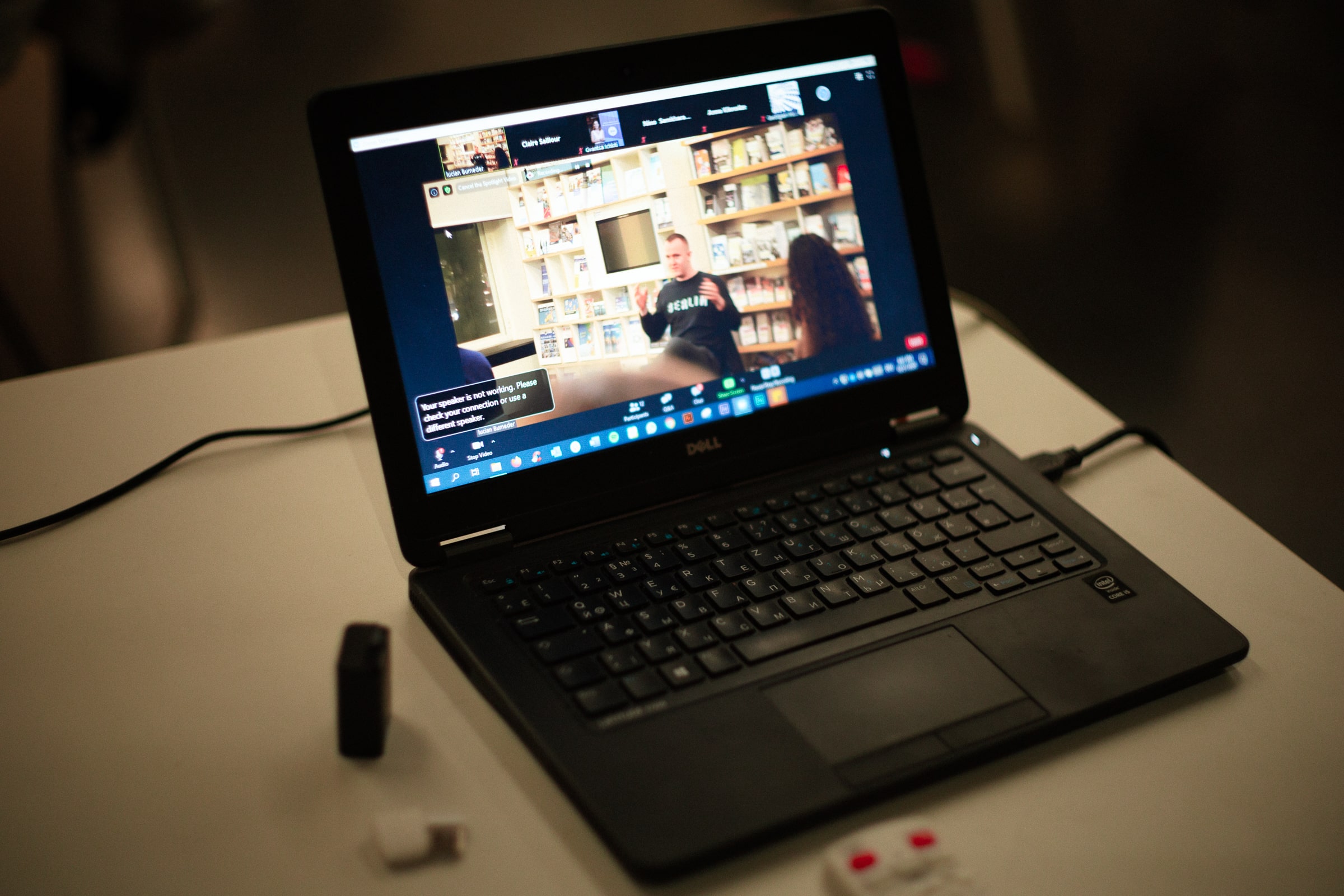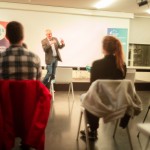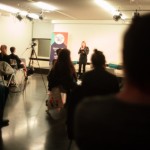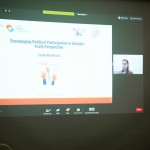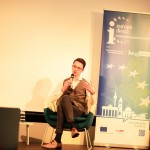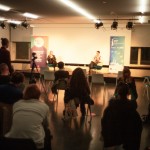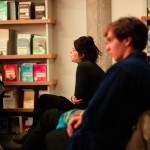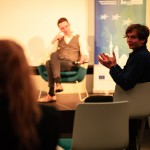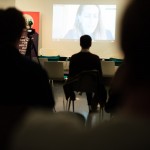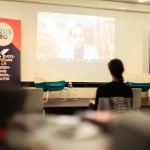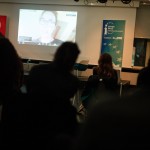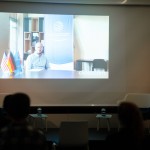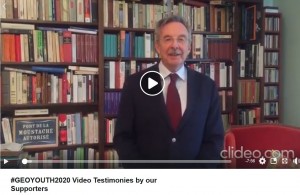Photo credits: Frieder Unselt
#GEOYOUTH2020 Manifesto Presentation & Discussion on youth participation (in Berlin & Online)
On 21 October, the team of #GEOYOUTH2020 invited experts and representatives of youth organisations to join our presentation of the Youth Manifesto which had been presented to party representatives in Tbilisi already in September. With the elections in Georgia less than two weeks away, speculations of future coalitions and consequences for the country’s youth were chief among the discussions in the Berlin Federal Centre for Political Education (LpB) and online.
Due to the ongoing pandemic, the event was held in a hybrid format, with a small audience in sitiu and additional participants and speakers joining online. After welcoming remarks by Frauke Seebass (Polis180), Reinhard Fischer (LpB), and Renata Skardžiūtė-Kereselidze (Georgian Institute of Politics, GIP), Gvantsa Ichkiti (GIP) presented the Youth Manifesto with its nine challenges and solution approaches developed by more than 150 youth accross the country.
The challenges include a lack of resources, existing stereotypes in society, the discriminatory treatment of ethnic minorities, the poor quality of education, an absence of youth platforms, a lack of trust in the political parties/nihilism, the closed structure of political parties, and nepotism. Anna Kiknadze (Polis180) explained the process from a series of train the trainers seminars to the development and implementation of regional youth summits all the way to the physical Manifesto and handing over to competing parties. While most of the activities had to be moved to digital formats, all involved agreed that the process was very successful.
This was further underlined by Mara Macharashvili, one of the project’s participants who addressed the audience via Zoom. She explained that all of the challenges named in the Manifesto have caused her and many of her peers to develop a rather indifferent attitude towards political processes, and that #GEOYOUTH2020 was an eye-opening experience for her, making her aware of her role as a political subject and motivating her to stay informed and get involved in political discussions and activities.
Additional credits were given by a group of experts and supporters of the project, in order of appearance: Ambassador Hans-Jürgen Heimsoeth, Special Representative for the Eastern Partnership at the Federal Foreign Office; Ambassador Levan Izoria of the Georgian Embassy in Berlin; Esther Kern, our trainer from Polis180; Givi Silagadze from GIP; Paulina Fröhlich, Das Progressive Zentrum; Khatia Kikalishvili, Zentrum Liberale Moderne; Florian Vitello, our Digital Support; and Cristina Bacalso, independent consultant and expert on youth policy.
The event then proceeded to a discussion on youth participation in party politics more broadly. Polis180 organised a comprehensive campaign several months before the 2019 European elections, a campaign targeting specifically young audiences, first-time voters. The goal of the campaign “jung&wählerisch” (young&choosy) was to empower young citizens to participate to the democratic process in any way, including the vote, given the traditionally low participation rate among this age group in European elections.
Strikingly, the campaign identified similar problems in the supposed lack of interest of young citizens for party politics or the democratic process: A Lack of information about the elections and what is at stake as well as the different choices that political parties are offering them; unequal access to information and knowledge about the democratic process; identification with certain topics but not particular party programs; a lack of confidence in they own competency as citizens; and the absence of feeling of ownership and impact in the democratic process.
Another learning was that political communication was very often not perceived by young citizens as being messages “for them”, and the channels of communication, the rhetoric and the visual language used by traditional parties were not appealing to young audiences – another communality with the Georgian Manifesto. The campaign was thus designed in order to overcome these obstacles for youth participation, and Claire concluded:
„The way you conceive and convey messages or design projects matter. Our communication campaign bright, colorful, fun, ironic. In my opinion it has to do with the working process. We managed this campaign and those projects in a bottom-up approach, including communication. And indeed, party politics still works mostly according to top-down principles, especially when it comes to “technical” aspects such as communication. Well, the young citizens we engaged and mobilise tell another story. Bottom-up works, and for political parties it may even be the only thing that might work in the future.“
Immanuel Benz from the Federal Ministry for Family Affairs, Senior Citizens, Women and Youth highlighted that his ministry advocates the idea that young people are „experts in their own cause“, encouraging them to take ownership of political processes concerning them. He explained that while „youth“ is in fact very heterogeneous, they do face distinct challenges different from other demographic groups.
Interestingly, a majority of young people strongly believe in democracy and want to actively shape, but we see a growing mistrust towards parties and political institutions they often do not feel represented by. Recognizing this, the Ministry has initiated an independent youth policy, and the federal government published a comprehensive youth strategy in 2019. Movements like Fridays for Future created a momentum for furthering this principle and to convince politicians of its importance. About 14 million people in Germany are between 12 and 27 years old.
The strategy addresses the fact that legislation and other government decisions have a distinct impact on young people, be it in the field of education, mobility, labour or others. In a whole-of-government approach, the Federal Republic now aims at implementing numerous measures to ensure the consideration of this perspective in their everyday work while actively involving young people in the process.
In the ensuing discussion, a variety of issues to political participation of young people was raised. Unlike in Georgia, German political youth wings do pave the way for a later career in political parties, but since most young people today do not identify with one particular party, it was agreed that new ways need to be found for their engagements and topics to be considered by decision makers including party representatives. Space to express their concerns and discuss forms of engagement is of chief importance, as well as spreading information on forms of participation and inclusive models of mobilisation.
As we have seen especially in emerging democracies such as Georgia, young citizens often take their demands to the streets, creating a loud uproar but often lacking sustainable structures to constructively engage with authorities for a longer period of time. The lack of (self-)organisation inhibits their impact, and their role in democratic processes continues to be contested. Therefore, new ways of engagement between youth and (party) politics need to be developed in a comprehensive and inclusive debate!
In order to provide an appropriate framework for this important discussion, we will soon publish a blog article that will expand on this discussion and aims at creating a fertile ground for tangible ideas and methods. Stay tuned!
Project term
01 March- 31 December 2020
Our supporters
The project is funded by the German Federal Foreign Office in the framework of the programme “Expanding Cooperation with Civil Society in the Eastern Partnership Countries and Russia”.


